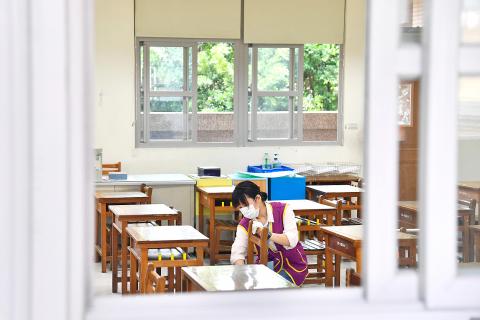Schools throughout the country are to be disinfected before the start of the new semester tomorrow, as part of the government’s efforts to prevent the spread of COVID-19, the Environmental Protection Administration (EPA) said yesterday.
As of Saturday, 87 percent of the disinfection work had been done at schools offering kindergarten to grade 12 (K-12), and by yesterday evening that figure would have risen to 99 percent, it said.
After that, only some schools in Taitung County and on the outlying islands would be left, but that work would be done today, the agency said.

Photo: CNA
The start of the spring semester was postponed for two weeks, with the reopening of K-12 schools postponed until tomorrow and most universities due to open on Monday next week, as the government stepped up its COVID-19 prevention efforts.
Meanwhile, pediatricians in Taipei and Changhua County on Saturday were asked to give personal hygiene advice to students preparing to return to school.
Children often forget to wash their hands after touching handrails, elevator buttons or other surfaces, said Tai Chi-shan (戴季珊), a pediatrician at Taipei’s Shu Tien clinic.
They could be infected by scratching their noses, rubbing their eyes or eating with unwashed hands, she said.
Some people only wet their hands when they wash them, she said, adding that they should use soap and scrub for at least 30 seconds before rinsing and drying their hands to effectively clean them.
A person’s hands should also be washed before putting on a surgical mask, she added.
The mask should cover the nose and mouth and fit snugly, she said, adding that when removing a mask, a person should hold on to the ear loops and turn the mask inside out before tossing it into a trashcan and washing their hands.
Maintaining a regular schedule, balanced diet and exercise can all help to boost the immune system, she added.
Separately, Changhua Christian Hospital pediatric neurologist Chang Tung-ming (張通銘) said that besides washing their hands regularly, people could prevent infections by disinfecting their jackets.
Jackets come into direct contact with the environment, but are typically not washed every day, he said.
Thus, when students return home from school, they should remove their jackets at the entrance and spray them with rubbing alcohol before hanging them in a well-ventilated space, such as a balcony, for about two hours before wearing them the next day, he said.
As for school uniforms and gym clothes, which are washed every day, students should change out of them — and place them in a laundry basket — as soon as they return home, he said.
Everyone should do the same while epidemic prevention efforts are ongoing, he said.
To prevent bacteria and viruses from being brought into the home, clothes that are not washed daily should be sprayed with disinfectant and hung in a well-ventilated area, while clothes that are should be changed as soon as a person enters their home, he said.
Additional reporting by CNA

CHANGING LANDSCAPE: Many of the part-time programs for educators were no longer needed, as many teachers obtain a graduate degree before joining the workforce, experts said Taiwanese universities this year canceled 86 programs, Ministry of Education data showed, with educators attributing the closures to the nation’s low birthrate as well as shifting trends. Fifty-three of the shuttered programs were part-time postgraduate degree programs, about 62 percent of the total, the most in the past five years, the data showed. National Taiwan Normal University (NTNU) discontinued the most part-time master’s programs, at 16: chemistry, life science, earth science, physics, fine arts, music, special education, health promotion and health education, educational psychology and counseling, education, design, Chinese as a second language, library and information sciences, mechatronics engineering, history, physical education

The Chinese military has boosted its capability to fight at a high tempo using the element of surprise and new technology, the Ministry of National Defense said in the Quadrennial Defense Review (QDR) published on Monday last week. The ministry highlighted Chinese People’s Liberation Army (PLA) developments showing significant changes in Beijing’s strategy for war on Taiwan. The PLA has made significant headway in building capabilities for all-weather, multi-domain intelligence, surveillance, operational control and a joint air-sea blockade against Taiwan’s lines of communication, it said. The PLA has also improved its capabilities in direct amphibious assault operations aimed at seizing strategically important beaches,

‘MALIGN PURPOSE’: Governments around the world conduct espionage operations, but China’s is different, as its ultimate goal is annexation, a think tank head said Taiwan is facing a growing existential threat from its own people spying for China, experts said, as the government seeks to toughen measures to stop Beijing’s infiltration efforts and deter Taiwanese turncoats. While Beijing and Taipei have been spying on each other for years, experts said that espionage posed a bigger threat to Taiwan due to the risk of a Chinese attack. Taiwan’s intelligence agency said China used “diverse channels and tactics” to infiltrate the nation’s military, government agencies and pro-China organizations. The main targets were retired and active members of the military, persuaded by money, blackmail or pro-China ideology to steal

The High Prosecutors’ Office yesterday withdrew an appeal against the acquittal of a former bank manager 22 years after his death, marking Taiwan’s first instance of prosecutors rendering posthumous justice to a wrongfully convicted defendant. Chu Ching-en (諸慶恩) — formerly a manager at the Taipei branch of BNP Paribas — was in 1999 accused by Weng Mao-chung (翁茂鍾), then-president of Chia Her Industrial Co, of forging a request for a fixed deposit of US$10 million by I-Hwa Industrial Co, a subsidiary of Chia Her, which was used as collateral. Chu was ruled not guilty in the first trial, but was found guilty